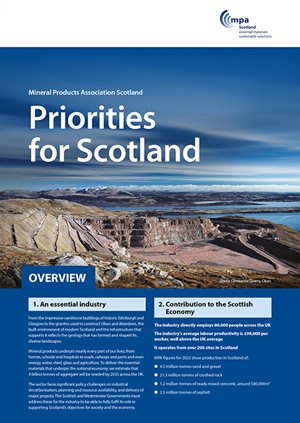 Scotland’s economic development and drive for decarbonisation depend on domestically available mineral products, according to a new document which sets out a series of policy recommendations for the Scottish Government.
Scotland’s economic development and drive for decarbonisation depend on domestically available mineral products, according to a new document which sets out a series of policy recommendations for the Scottish Government.
Launched at a special event in Edinburgh on 29 February 2024, where guest speaker was former Cabinet Secretary for Finance and the Economy Kate Forbes MSP, the new document Priorities for Scotland has been published by the Mineral Products Association Scotland (MPAS).
 Attending the event were policy makers, officials and representatives of companies that produce heavyside building materials like aggregates, concrete and asphalt – around 30 million tonnes of these materials are manufactured in Scotland every year, the biggest flow of materials in the Scottish economy.
Attending the event were policy makers, officials and representatives of companies that produce heavyside building materials like aggregates, concrete and asphalt – around 30 million tonnes of these materials are manufactured in Scotland every year, the biggest flow of materials in the Scottish economy.
Essential for renewable energy infrastructure, transport networks, schools and hospitals, flood defences, urban regeneration and housing, the mineral products sector has a key role in supporting sustainable growth in Scotland. In the new publication MPAS proposes a series of policy recommendations that will enable the industry to fully play its part.
Among the key issues highlighted in Priorities for Scotland are:
- Avoiding unintended consequences of devolving the Aggregates Tax
- Extending the Industrial Energy Transformation Fund, removing funding windows
- Ensuring adequate reserves of aggregates to meet future material needs
- Planning the infrastructure for material flows and manufacturing facilities
- Recognising the industry’s unmatched track record on biodiversity gain
MPAS is also calling on the Scottish Government to establish a collaborative Scottish Minerals Forum to help deliver the best for the industry and the best for Scotland.
Alan MacKenzie, Chair of MPA Scotland, said: “It was great to hear Kate’s views on many of the challenges and opportunities we face in Scotland, from the huge potential of floating offshore wind to what we can do to deliver employment and career opportunities, more biodiversity net gain and a globally competitive Scottish economy. I really hope this document lands well with Scottish Government and beyond, as an offer of partnership to help each other deliver for Scotland.”
Alan Doak, Director of MPA Scotland, said: “The detailed work we have done on the proposed Scottish Aggregates Tax in dialogue with Revenue Scotland and the Scottish Government shows the value of working together in Scotland’s interests. We are very keen to establish a Scottish Minerals Forum to bring together all the key players on the future of our industry, with industry, Scottish Government, Local Government and other key partners to ensure that we can ensure a supply of essential materials, environmental benefit and delivery of key infrastructure.”
The document Priorities for Scotland is available on the MPA website.
ENDS
Notes for Editors:
Photo (from left to right): MPA Scotland Chair Alan MacKenzie, Kate Forbes MSP, MPA CEO Jon Prichard, and MPA Scotland Director Alan Doak.
About MPA Scotland:
MPA Scotland is an affiliate of the wider Mineral Products Association, and represents thirteen independent SME quarrying companies, as well as five major and global companies. Collectively, these businesses employ over 3,000 people across Scotland.
About the Mineral Products Association:
The Mineral Products Association (MPA) is the trade association for the aggregates, asphalt, cement, concrete, dimension stone, lime, mortar and industrial sand industries. With affiliation of the British Association of Reinforcement (BAR), the British Calcium Carbonate Federation, the Cement Admixtures Association (CAA), CONSTRUCT, Eurobitume, MPA Northern Ireland, MPA Scotland and the UK Quality Ash Association (UKQAA), it has a growing membership of 520 companies and is the sectoral voice for mineral products. MPA membership is made up of the vast majority of independent SME quarrying companies throughout the UK, as well as the 9 major international and global companies. It covers 100% of UK cement and lime production, 90% of GB aggregates production, 95% of asphalt and over 70% of ready-mixed concrete and precast concrete production. In 2021, the industry supplied £22 billion worth of materials and services to the Economy. It is also the largest supplier to the construction industry, which had annual output valued at £178 billion. Industry production represents the largest materials flow in the UK economy and is also one of the largest manufacturing sectors.
For media enquiries, contact Elizabeth Clements at: Elizabeth.Clements@mineralproducts.org